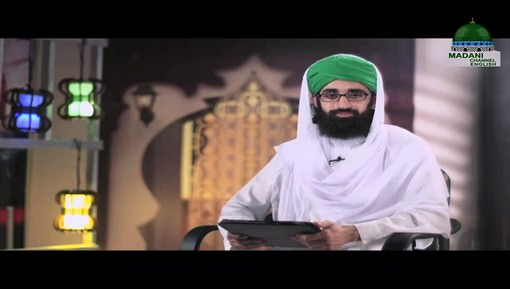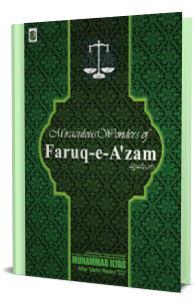
Bright Stars
The Ascetic Caliph: Sayyiduna Umar Al-Farooq رَضِىَ الـلّٰـهُ عَـنْهُ
Mawlana Adnan Ahmad Attari Madani
Despite ruling over a vast and powerful empire, the Commander of the Faithful, Sayyiduna Umar al-Farooq’s رَضِىَ الـلّٰـهُ عَـنْهُ lifestyle was far removed from the ostentatious opulence and hedonism of other rulers. Preferring to live like an ordinary citizen, he led a simple life void of riches, luxury, and extravagance.
Journey to Syria
Sayyiduna Abu Ubaydah b. al-Jarrah رَضِىَ الـلّٰـهُ عَـنْهُ accompanied Sayyiduna Umar al-Farooq رَضِىَ الـلّٰـهُ عَـنْهُ to Syria. Reaching a river, they went to the place where the water was most shallow to cross it. Sayyiduna Umar رَضِىَ الـلّٰـهُ عَـنْهُ dismounted his camel and removed his leather socks, placing them on his shoulder. He then took his camel’s reigns and entered the water. Seeing this, Sayyiduna Abu Ubaydah b. al-Jarrah رَضِىَ الـلّٰـهُ عَـنْهُ remarked, ‘Commander of the Faithful! You are doing this, but I do not want the locals to look at you with their gazes raised.’ He رَضِىَ الـلّٰـهُ عَـنْهُ replied, ‘Alas, Abu Ubaydah! If someone besides you had said this, I would have made an example out of him for the entire Muslim nation! Do you not remember that we were a nation without honour; then, Allah granted us honour through Islam. Thus, whenever we seek honour through something other than Islam, Allah will disgrace us,’ (Mustadrak, vol. 1, p. 236, Hadith 214).
Journey for Hajj
While travelling to Makkah for Hajj, he رَضِىَ الـلّٰـهُ عَـنْهُ neither pitched a tent nor put up a screen when stopping to rest. Instead, he would suffice with a simple shawl and a leather dining cloth tied to a tree and sit in its shade, (Tareekh Ibn ‘Asakir, vol. 44, p. 305).
Resting on the ground
Whenever he wanted to rest during a journey, he would make a mound out of soil, place a cloth over it, and then rest, (Musannaf Ibn Abi Shaybah, vol. 19, p. 144, Raqm 35603).
Barefoot
He would be seen walking barefoot to the Eid prayer, (Mustadrak, vol. 4, p. 32, Hadith 4535).
Coarse flour
From the moment he saw the Beloved Prophet صَلَّى الـلّٰـهُ عَلَيْهِ وَاٰلِهٖ وَسَلَّم eating bread made from unrefined flour, he never ate bread made from refined flour again, (Tabaqat Ibn Sa’d, vol. 1, p. 301).
Two condiments
When presented with bread and two condiments, cold soup and olives, he remarked, ‘Two condiments in one bowl? I will never eat this,’ (Tabaqat Ibn Sa’d, vol. 3, p. 243).
Dry bread
He would sometimes break dry Syrian bread with his teeth and eat it. Someone asked him, ‘If you wish, I can bring softer food for you,’ to which he replied ‘Is there anybody in your eyes from among the Arabs who has greater authority than me in acquiring fine food?’ (Riyad-un-Nadirah, vol. 1, p. 365), alluding to his ability to acquire such food but choice to be content with simple bread.
Simple food
Sometimes he ate pieces of meat boiled in water or small amounts of fresh meat, (Tareekh Ibn ‘Asakir, vol. 44, p. 298). At times, he would be severely hungry yet, would only consume one date and some water, stating, ‘Destruction is for the one whose stomach leads him to Hell,’ (Manaqib Ameer-ul-Mu’mineen Umar b. al-Khattab, p. 135). A visiting delegation observed him eating dry bread with either unrefined butter, olives, or milk every day, (Tareekh Ibn ‘Asakir, vol. 44, p. 298; Zuhd Ibn-ul-Mubarak, p. 204).
Torn shirt
During his trip to Syria, when he رَضِىَ الـلّٰـهُ عَـنْهُ reached Aylah, his shirt had torn from the back due to the long journey. So he رَضِىَ الـلّٰـهُ عَـنْهُ gave it to the local governor to wash and repair. The governor had it washed and patched, but also had a new shirt sewn, and gifted it to him. When he رَضِىَ الـلّٰـهُ عَـنْهُ saw the new shirt, he passed his hand over it and then wore his old, patched shirt, adding that ‘This shirt of mine absorbs more perspiration in comparison to the new one,’ (Tareekh Al-Rusul wal Muluk, vol. 4, p. 64).
Apologising for arriving late
Once, arriving late for Jumu’ah prayer, he readily apologised to the people: ‘I am late because of this shirt; I have no shirt besides this,’ (Tabaqat Ibn Sa’d, vol. 3, p. 251).
Four patches
Someone saw that there were four patches on his shirt between the shoulders, (Musannaf Ibn Abi Shaybah, vol. 19, p. 139, Raqm 35588).
Patched sarong
Someone once saw that there were three patches on his clothing in the same place, i.e. one patch had become undone, so another had been sewn on top of it. Another person saw that during his reign, he delivered a sermon while wearing a sarong with twelve repair patches on it, (Mirat-ul-Manajih, vol. 6, p. 108). Others reported seeing him circumambulate the Ka’bah while wearing a sarong with twelve patches on it, (Tabaqat Ibn Sa’d, vol. 3, p. 250). He was also seen offering salah with a sarong that was covered in patches and strips of leather, (Tabaqat Ibn Sa’d, vol. 3, p. 250). During the famine of Madinah, sixteen patches were seen on his sarong, (Tabaqat Ibn Sa’d, vol. 3, p. 243).
Sufficing with essentials
He رَضِىَ الـلّٰـهُ عَـنْهُ would bring only sufficient amounts of food for himself and his family. He رَضِىَ الـلّٰـهُ عَـنْهُ would buy one piece of clothing in the summer, and if it would tear, he would patch it up and use it for as long as he could. Every year, he رَضِىَ الـلّٰـهُ عَـنْهُ would purchase lower quality clothing than the previous year. Someone once spoke to him about this, to which he رَضِىَ الـلّٰـهُ عَـنْهُ replied, ‘I take my expenses from the wealth of the Muslims, so this is sufficient for me,’[1] (Tabaqat Ibn Sa’d, vol. 3, p. 234).
Daily expenditure
Sayyiduna Umar al-Farooq رَضِىَ الـلّٰـهُ عَـنْهُ would spend only two dirhams a day on himself and his family members, (Tabaqat Ibn Sa’d, vol. 3, p. 234).
Expenses for Hajj
For his entire Hajj journey, he spent only 180 dirhams, (Tabaqat Ibn Sa’d, vol. 3, p. 234).
Debt
Whenever he had a need, he would borrow money from the public treasury. Sometimes, the head of the treasury would come to him, ask for the borrowed money and make him return it, so he would take the borrowed amount and go to him. Upon receiving his salary, he would clear the loan, (Manaqib Ameer-ul-Mu’mineen Umar b al-Khattab, p. 100).
Love for Miswak
On the first night of Ramadan-ul-Mubarak, he would deliver a sermon counselling the people, (Musannaf Abdul-Razzaq, vol. 4, p. 204, Hadith 7778). He رَضِىَ الـلّٰـهُ عَـنْهُ was often seen using the miswak, (Tabqat Ibn-e-Sa’d, vol. 3, p. 220).
We too should attempt in this era to adopt every possible action of simplicity and humility which elevated Sayyiduna Umar al-Farooq رَضِىَ الـلّٰـهُ عَـنْهُ to greatness, and attain the blessings of imitating him.
Martyrdom
The great caliph of the Muslims was severely wounded on Wednesday, 26 Dhul Hijjah, and was laid to rest in the sacred Prophetic Chamber next to the Beloved Prophet صَلَّى الـلّٰـهُ عَلَيْهِ وَاٰلِهٖ وَسَلَّم and Sayyiduna Abu Bakr al-Siddiq رَضِىَ الـلّٰـهُ عَـنْهُ on Sunday, 1 Muharram-ul-Haraam, 24 AH. His reign spanned approximately 10 years, 5 months, and 21 days, (Tabaqat Ibn Sa’d, vol. 3, p. 278).
[1] i.e. his salary as caliph is taken from the government treasury.


















Comments